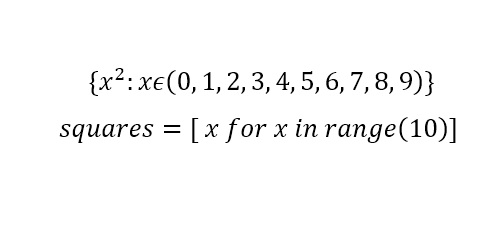In the post Using lists with Python 3 I explained something about lists in Python, however, since Python is very slow in FOR-LOOPS, to generate lists Python supports a concept named “list comprehensions“. “list comprehensions” can be used to construct lists in a very natural and easy way, like a mathematician is used to do.
For example:
NEWLIST_LOOP = []
for counter in range(10):
NEWLIST_LOOP.append(counter)
The above piece of code generates this list: [0, 1, 2, 3, 4, 5, 6, 7, 8, 9], using list comprehensions the same list can be generated with the following line of code:
NEWLIST_COMP = [x for x in range(10)]
one line of code versus 3 lines of code….
List comprehensions advantages:
- Compact notation:
From the example above we have already seen the first advantage, we could write less code. And, as any SW developer knows “less code means less bugs” - Speed:
Another effect on using LC is to have better performances, for example imagine you have a square matrix (10000×10000) and you want to flatten this matrix. Using for-loop
@time_fun
def flatten_for(matrix):
flat = []
for row in matrix:
for x in row:
flat.append(x)
return flat
and using LC
@time_fun
def flatten_lc(matrix):
return [x for row in matrix for x in row]
to get the time spent I use the time_fun decorator explained at ()
if __name__ == '__main__':
matr = generate_mat(10000)
bbb = flatten_for(matr)
ccc = flatten_lc(matr)
if bbb == ccc:
print("Q")
And the results will be:
flatten_for 8024.824380874634 flatten_lc 4652.031660079956
You can find the full source code for this example at ()
Let’s go ahead with other examples:
LIST_COMP_2 = [x**2 for x in range(10)] print(LIST_COMP_2)
will generate a list containing the squares of the first 10 integers
[0, 1, 4, 9, 16, 25, 36, 49, 64, 81]
Imagine you want to create a new list containing all elements of list_comp_2 that are even, with for-loop code:
LIST_COMP_3 = []
for elem in LIST_COMP_2:
if elem % 2 == 0:
LIST_COMP_3.append(elem)
print(LIST_COMP_3)
And the results will be:
[0, 4, 16, 36, 64]
the same list using list comprehensions
LIST_COMP_4 = [x for x in LIST_COMP_2 if x%2 == 0] print(LIST_COMP_4)
And the results will be:
[0, 4, 16, 36, 64]
all elements contained in both LIST_COMP_2 and NEWLIST_COMP that are even:
LIST_COMP_5 = [x for x in LIST_COMP_2 if x in NEWLIST_COMP and x%2 == 0]
And the results will be:
[0, 4]
the same list using for-loop
LIST_6 = []
for elem in LIST_COMP_2:
if elem in NEWLIST_COMP:
if elem%2 == 0:
LIST_6.append(elem)
And the results will be:
[0, 4]
Really great concept.
You can find full source code for this blog post at my github at lists_and_comprehension.py

